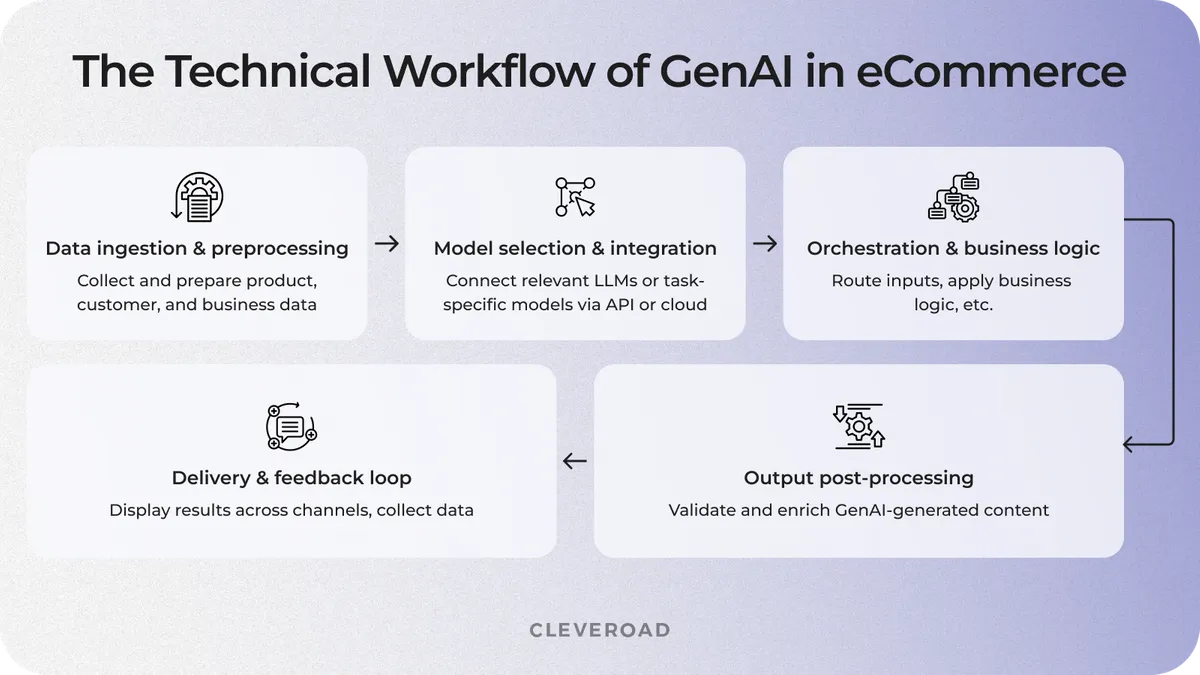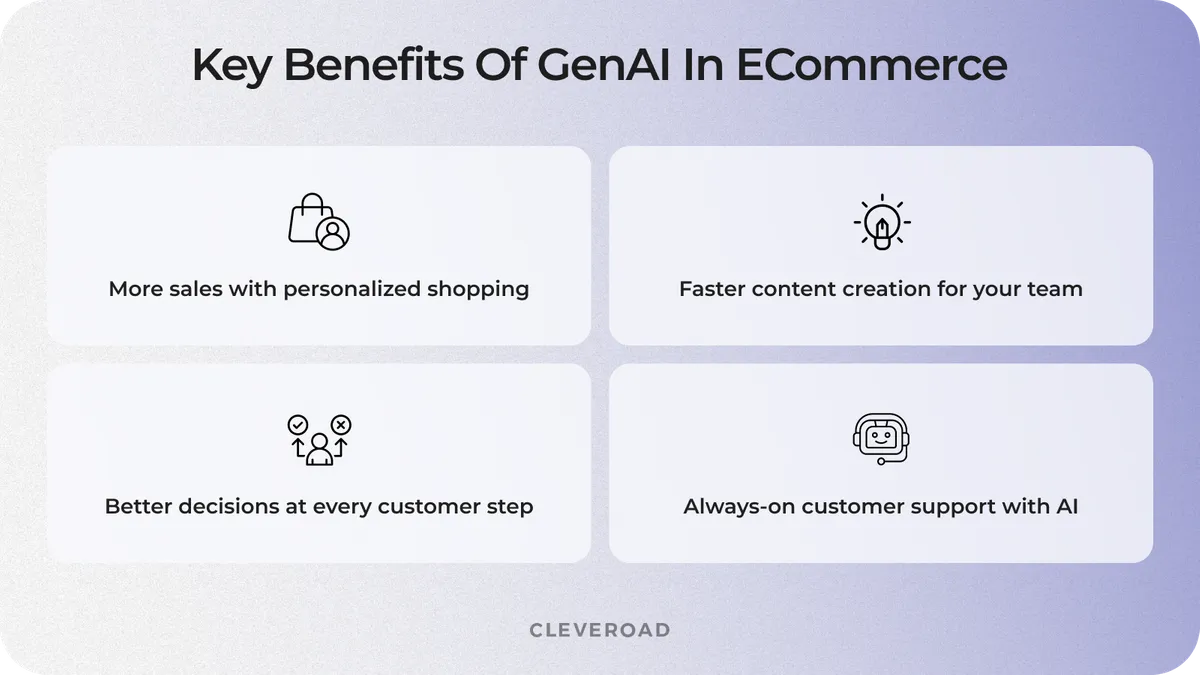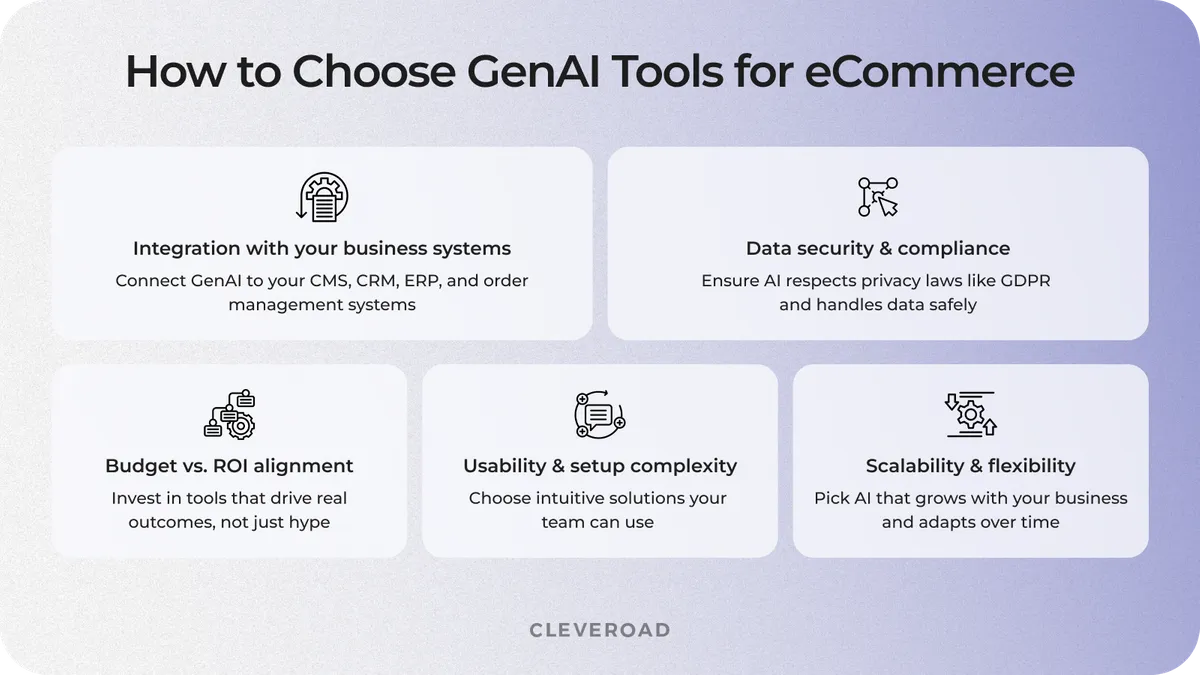Generative AI in eCommerce: Major Use Cases for B2B and B2C Businesses
26 Aug 2025
16 Min
126 Views
Generative AI in eCommerce is a game-changer already reshaping how B2B and B2C businesses serve, and retain customers. GenAI automates manual tasks, shortens decision cycles. It also delivers tailored customer and shopping experiences at scale from personalized shopping assistants to AI-generated product descriptions and predictive inventory management.
At Cleveroad, we help eCommerce companies integrate GenAI into scalable software solutions that enhance customer engagement and streamline operations. In this article, we break down the most impactful use cases of generative AI for eCommerce, backed by real-world examples and expert insights to help you build a smarter, faster, and more scalable digital strategy.
Key takeaways:
- GenAI drives revenue through real-time personalization by adapting product recommendations, content, and offers to individual customer behavior.
- AI automates content creation and customer support, reducing manual workload and operational costs while improving response speed.
- Intelligent business decisions start with data and GenAI: from predictive inventory to dynamic pricing and user segmentation.
- Successful GenAI adoption depends on system fit, requiring the right architecture, integrations, and vendor expertise to deliver measurable results.
The Basics of Gen AI in eCommerce
Generative AI in eCommerce refers to the use of advanced AI models that create content (such as product descriptions, campaign assets, support replies, or personalized recommendations) based on live customer data and catalog inputs. These systems allow businesses to automate content operations, tailor shopping journeys, and optimize user interactions across all digital touchpoints.
To see how this works in practice, explore the visual breakdown of GenAI’s working mechanism in eCommerce below:

How GenAI operates in eCommerce
Once integrated, generative AI for eCommerce empowers brands to build smart chatbots and respond to customer behavior in real time, while improving satisfaction and driving retention through instant adaptation, while lowering operational costs.
Rule-based, predictive, and generative AI in eCommerce
Generative AI in commerce generally falls into three types: rule-based, predictive, and generative; each serving specific goals and helping businesses respond to evolving customer expectations:
- Rule-based systems follow predefined logic, making them ideal for structured flows like FAQ bots, order tracking, and transactional workflows.
- Predictive models use historical data and market trends to forecast demand, adjust pricing, and tailor promotions. These systems rely on machine learning in retail to continuously refine outputs based on customer behavior trends and transaction history.
- Generative AI, the most advanced layer, produces human-like content in real time: chat replies, emails, personalized product descriptions, promotions, and so on. GenAI models analyze unstructured inputs like reviews, or CRM logs to generate context-aware outputs.
Technically, these three AI types complement each other across the eCommerce stack. Rule-based flows handle predictable inputs with speed, predictive models identify patterns across customer segments, and generative models adapt responses in real time to maximize customer satisfaction. Together, they enable end-to-end personalization: hyper-relevant offers with personalized product recommendations and constant human-like customer support and marketing.
When integrated into an eCommerce platform, GenAI can fully automate support and accelerate content production. Retailers gain more than efficiency: they unlock deep insight into what their customers want, when, and why, turning fragmented experiences into a conversion-driven flow.
And as Andy Jassy, CEO of Amazon, puts it, the impact of GenAI on customer experience is nothing short of transformational:
Andy Jassy
CEO of Amazon Web Services
“Generative AI is going to reinvent virtually every customer experience we know, and enable altogether new ones about which we’ve only fantasized.”
The Major Benefits of Generative AI for eCommerce Businesses
Whether you manage a B2B product catalog or run a D2C storefront, integrating GenAI helps align your strategy with real-time customer needs, while unlocking significant operational efficiency and growth potential. Below, we explore four key benefits that show how generative AI for eCommerce can transform your business at scale.

Major advantages of gen AI in the domain of eCommerce
Faster content creation for your team
Updating thousands of product listing pages or localizing ad creatives manually wastes time and budget. With generative AI-powered tools, teams can instantly generate SEO-optimized descriptions, headlines, and visual content, drastically cutting time-to-market.
A Shopify study shows that merchants using ecommerce generative AI tools like AI description generators cut content production time by over 50%, helping employees focus on creative tasks rather than repetitive input.
More sales with personalized shopping
AI-powered engines deliver personalized customer experiences by adapting recommendations, promotions, and navigation to individual behavior and preferences. According to McKinsey, personalization can drive a 10–15% revenue uplift, and for top performers, that number reaches 25%.
The power of generative AI in eCommerce enhances sales even further by enabling dynamic product recommendations, personalized bundles, and shopping assistants that respond in natural language. This way, Gen AI helps reduce friction in the buyer journey and increases average order value.
Always-on customer support with AI
A core benefit of ecommerce customer service automation is uninterrupted assistance. GenAI chatbots handle customer queries 24/7 using conversational generative AI technology, helping resolve issues instantly, upsell when relevant, and reduce human support volume.
According to Zendesk, 88% of customer experience leaders say personalization is critical when adopting new technologies, including AI, to meet rising customer expectations. GenAI plays a key role here, enabling brands to deliver context-aware, brand-aligned service that builds loyalty.
Better decisions at every customer step
Generative AI and ecommerce strategy go hand in hand when it comes to data-driven action like pricing adjustments or inventory planning. An AI system trained on sales data and trends can identify what offers work best for specific audience segments and when to deploy them.
With generative AI applications in e-Commerce done in place, teams make faster and smarter choices: from A/B testing layouts to optimizing promotions and product placements in real time, boosting ROI while minimizing manual analysis.
TOP-4 Gen AI eCommerce Use Cases
Generative AI in eCommerce is widely used to simplify content creation and enhance the customer experience: from automating product descriptions to personalizing interactions in real time. Below are four practical use cases that demonstrate how GenAI for eCommerce delivers measurable impact across personalization, automation, and operational efficiency.
Conversational commerce with GenAI
Consumers expect fast, personalized, and human-like responses across e-commerce websites and chat interfaces. Conversational agents powered by generative AI answer customer questions, help them find products, and guide them through completing purchases. With the integration of generative AI eCommerce, brands can deploy bots that support full-funnel journeys and build loyalty through natural language interaction.
For example, Walmart launched Sparky: a generative AI chatbot in its mobile app that can answer shopper questions or provide personalized product recommendations based on user requests. This AI assistant is expanding in capabilities, with plans to eventually book services or even make purchases on customers’ behalf for a seamless conversational shopping experience
AI-driven advanced product search
Traditional keyword-based search can frustrate users. Advanced generative AI for e-commerce transforms product discovery by enabling natural-language, image-based, or voice-enabled queries. Instead of matching exact keywords, GenAI models interpret user intent, context, and even conversational phrasing, understanding what the customer truly wants. These models also use embeddings and semantic search to surface highly relevant results, even if product names or descriptions don’t include the user’s exact words.
Stitch Fix improves product discovery using generative AI algorithms that look beyond basic keyword matching. The company uses customers’ taste profiles, body measurements, and purchase behavior to create personalized outfit looks. Rather than making shoppers hunt manually, Stitch Fix serves up extremely contextual recommendations, so the discovery process is quicker, more intelligent, and more intent-based.
Explore our AI Strategy Advisor to see how Cleveroad helps retailers design and implement generative AI search solutions boosting product discovery, and increasing conversion rates
Enhanced merchandising strategies
GenAI helps merchandisers create promotional content faster than ever. It also analyzes customer data to identify high-performing product combinations, timing for drops, or even regional variations in demand. This use of AI results in smarter product placements and optimized category layouts, all driven by real-time analysis of customer data and behavior patterns.
Dynamic pricing, in particular, benefits from generative AI’s ability to adjust prices instantly based on demand shifts, user intent, or regional trends, reducing the need for manual updates and improving profit margins.Retailers that invest in generative AI development services gain agility in how they react to trends and consumer behavior.
According to APNews, Walmart launches generative AI to optimize pricing on its website and app in real time. The company has trialed AI-based dynamic pricing, in which algorithms change product prices in real time according to drivers like demand, the time of day or by reacting more quickly to trends (e.g., dropping prices as customer demand peaks or protecting margins if demand begins to wane), Walmart’s merchandising team can now optimize sales and profitability without a relentless regimen of manual repricing. This flexible pricing approach is one example of how GenAI gives retailers a leg up in merchandising.
AI-powered product visualization
Home decor, or cosmetics, visual representation is everything for the fashion industry. Generative AI now powers virtual try-ons, 3D product previews, and dynamic customization experiences, making eCommerce interactions more visual, immersive, and personalized.
The Sephora Virtual Artist is a great example of generative AI helping to improve product visualization in the case of cosmetics. This technology uses augmented reality in tandem with generative algorithms to allow customers to virtually “try on” makeup products by using their phone or computer camera. In real time, the AI replicates how various lipstick shades, eye shadows, or other cosmetics might look on the user’s face (factoring in skin tone and facial features). Through a realistic preview, customers become more assured about how the product will look, which results in better engagement and lower returns, all by providing the immersive AI-led experience that customers demand.
Explore our Generative AI development services and see how Cleveroad helps businesses design, integrate, test, and launch AI-driven eCommerce solutions
Major Functionality of Gen AI eCommerce Tools for Customer Services
Let’s explore the core capabilities of a modern generative AI eCommerce solution, and show how Cleveroad helps implement them by integrating the right AI technologies from AWS, Google Cloud, or Azure for measurable business impact.
Instant multilingual support
Handling customer queries in multiple languages is essential for global eCommerce. For brands looking to scale internationally, generative AI ecommerce strategy makes it possible through real-time translation and naturally localized communication, not robotic or templated output.
To achieve this, our engineers integrate top-tier cloud tools such as:
- AWS: Amazon Translate + Bedrock (Claude or Titan)
- Google Cloud: Translation API + Vertex AI PaLM
- Azure: Translator + Azure OpenAI GPT-4
By integrating these technologies into your support workflows, our team helps you cut resolution time, reduce ticket volumes, and offload routine queries at scale. It’s one of the clearest benefits of Generative AI utilization for eCommerce. Our experts can also walk you through how to build Generative AI model that ensures seamless communication and drives global business growth.
AI-powered FAQ automation
Static FAQ pages don’t scale. Today’s AI agents are trained to understand and respond to customer questions based on existing knowledge bases, documents, or CRM data. Instead of browsing, users simply ask, and the bot provides direct, human-like answers.
At Cleveroad, we implement this functionality using tools like:
- AWS: Amazon Kendra combined with Bedrock LLMs
- Google Cloud: Vertex AI Search & Conversation with PaLM
- Azure: Cognitive Search enhanced by Azure OpenAI
By integrating these technologies into your support workflows, our team helps you cut resolution time, reduce ticket volumes, and offload routine queries. It highlights one of the most direct gains of GenAI in eCommerce.
Context-aware personalized replies
Responding with generic messages kills customer trust. With generative AI in commerce, replies are now based on previous purchases, preferences, and live interactions, making support feel truly human.
Cleveroad integrates enterprise-grade AI tools to enable this advanced level of personalization for eCommerce platforms:
- AWS: Amazon Personalize + Bedrock (Claude)
- Google: Vertex AI Recommendation AI + PaLM
- Azure: Dynamics 365 Customer Insights + Azure OpenAI
These solutions analyze customer data in real time to generate responses that match tone, context, and intent, improving the customer experience at every touchpoint. Through our AI development services, Cleveroad helps eCommerce businesses design, train, and deploy GenAI-powered personalization systems tailored to their audience and domain.
Emotion detection and escalation
Not all eCommerce customers write “I’m angry,” but their tone, word choice, and phrasing often reveal how they feel. Large Language Models (LLMs) don’t read emotions, but they perform sentiment analysis, classifying text as positive, negative, neutral, or urgent. In eCommerce, this is critical: one unresolved issue can lead to cart abandonment or churn.
Generative AI for eCommerce turns this analysis into action. Based on sentiment classification, support systems can instantly escalate high-risk conversations to a live agent or generate a context-aware GenAI response that acknowledges the issue in the right tone.
At Cleveroad, we implement sentiment-aware escalation workflows using the following cloud-native AI tools:
- AWS: Amazon Comprehend and Bedrock
- Google Cloud: Natural Language API + Vertex AI conversation models
- Azure: Cognitive Services Text Analytics + Azure OpenAI
Such a generative AI ecommerce solution allows support systems to detect frustration or urgency early and respond appropriately, either by escalating the issue in real time or crafting emotionally intelligent, brand-aligned replies. This approach helps businesses maintain trust and defuse critical moments before they impact customer satisfaction.
Let’s make a summary of how Cleveroad applies leading GenAI tools to deliver key customer service features for eCommerce businesses.
| GenAI functionality in eCommerce | What it solves | Tools we use |
Instant multilingual support | Delivers real-time, localized communication in multiple languages |
|
AI-powered FAQ automation | Replaces static FAQ pages with intelligent, scalable Q&A agents |
|
Context-aware personalized replies | Generates human-like, context-aware responses based on behavior and history |
|
Emotion detection and escalation | Identifies sentiment and triggers escalation or tailored AI response |
|
What to Consider When Choosing GenAI Tools for eCommerce Success
Success with generative AI e-commerce solutions doesn’t begin with the tech: it starts with clarity. To deliver value, your AI tools must work seamlessly with your business operations, comply with industry standards, and evolve as your brand grows. Based on Cleveroad’s experience in gen AI for eCommerce, here’s what we recommend evaluating before you invest.

Cleveroad’s advice on how to choose Gen AI tools for eCommerce
Ensure integration with your existing business systems
To deliver a consistent result, generative AI must seamlessly connect with your current e-commerce ecosystem, like CMS, CRM, PIM, ERP, or warehouse tools. Cleveroad helps clients implement modular architectures that separate business logic, data layers, and AI components, making it easier to integrate and scale GenAI across specific functions like catalog management, customer support, or personalization. This structure allows teams to update or extend individual modules without rebuilding the entire system, ensuring flexibility and faster time to value.
We support integrations with tools like Shopify Plus, Salesforce Commerce, and custom-built platforms, making sure your eCommerce generative AI connects, not conflicts.
Prioritize data security and privacy compliance
As AI can take action based on sensitive user data, you must protect it. Your GenAI eCommerce solution must comply with security standards and ensure ethical data handling. Moreover, it should adhere to regional data privacy regulations, such as GDPR for the EU or CCPA for California, US.
Cleveroad designs genAI-based eCommerce solutions (including chatbots, content engines, and customer analytics tools) with built-in access control, data anonymization where required, and full compliance with regional privacy laws, giving your team peace of mind as you scale.
We also have extensive experience building solutions for highly regulated industries. For one of our clients in the European medical device sector, we developed a quality management system that met strict regulatory requirements, including ISO 13485 and MDR. The platform included role-based access, audit logging, and compliance-focused workflows, ensuring data integrity and security throughout.
Listen to Breanne Butler’s review sharing her experience working with Cleveroad on a compliance-focused digital solution:
Breanne Butler, Client Liaison Officer at Prime Path Medtech™
Align your budget with expected AI ROI
AI should pay off. But to get there, you must match costs to tangible outcomes: like improved conversion rates, reduced manual work, or higher average order value. When you choose a generative AI solution, chase results.
At Cleveroad, we help eCommerce businesses align GenAI investments with clear business goals. As part of our AI consulting services, we estimate the ROI of each use case upfront and focus on features that deliver measurable impact. It avoids overengineering and unnecessary spend.
We support companies across the full lifecycle, from early-stage discovery and Proof-of-Concept (PoC) to MVP launch and scalable rollout. You get full transparency into cost and value at every step, so you can scale gradually and reduce risk without overspending on unnecessary features.
Evaluate setup complexity and usability
Even the smartest AI is useless if your team can’t use it. Aim for tools that are intuitive, well-documented, and maintainable, whether it’s a chatbot dashboard or a backend content generator.
Generative AI in e-commerce can also enhance productivity only when it fits into real workflows. We guide teams through onboarding, training, and documentation, so they get value from day one without a steep learning curve.
When you use generative AI to produce content, optimize UX, or personalize experiences, the real win comes from long-term fit, not just quick wins. With the right approach, GenAI becomes a growth engine. With Cleveroad, it also becomes a competitive advantage.
How Cleveroad Can Help You in Integrating GenAI for eCommerce
Cleveroad is a software development company with over 13 years of experience in building scalable, high-performance digital retail and e-commerce solutions. Today, we help eCommerce businesses implement generative AI technologies to automate operations, personalize customer journeys, and drive sustainable revenue growth.
What you get by partnering with Cleveroad for GenAI eCommerce integration:
- End-to-end GenAI development services: from initial AI consulting and use case validation to PoC creation, testing, and full-scale deployment of AI model tailored to your eCommerce needs.
- Certified data security, and quality standards: we hold ISO/IEC 27001:2013 and ISO 9001:2015 certifications, ensuring best practices in information security and software quality management across all our workflows during the ecommerce systems development.
- Smooth integration with your existing eCommerce ecosystem: we build solutions that work seamlessly with platforms like Shopify, Magento, BigCommerce, or custom stacks, while securely handling sensitive customer and transaction data.
- Cloud-native GenAI solutions: as an AWS Select Tier Partner, we use tools like Amazon Bedrock and Google Vertex AI to develop scalable, cloud-based generative AI architectures. Our engineers also work with models like GPT-4, Claude, and PaLM 2 to create highly personalized user experiences.
- Executive AI workshops: Cleveroad experts help your leadership team identify high-impact AI opportunities, reduce adoption risks, and design a clear strategic roadmap aligned with your core business goals.
Cleveroad helps eCommerce businesses launch scalable platforms that streamline customer journeys, integrate payment systems, and support flexible product management, while ensuring fast deployment and smooth UX.
We’d like to share one of our successful eCommerce portfolio cases — a Marketplace Platform for B2C customers.
A US-based entrepreneur partnered with Cleveroad to create a full-featured B2C marketplace platform aimed at connecting sellers with individual buyers through both a mobile app and web dashboard. The solution includes key eCommerce modules such as catalog and product management, payment gateway integration, flexible delivery options, and advanced admin dashboards for managing orders and user activity.
To build a modern, responsive architecture, we used React.js, Node.js, and AWS cloud infrastructure, enabling secure data handling, seamless scalability, and performance optimized for high-load business scenarios. We also ensured that the platform could grow easily: it's designed as a modular, API-driven solution that can support future integration of AI-powered features like smart search, dynamic pricing, or product recommendation engines while offering long-term flexibility for the business.
Gen AI implementation in eCommerce from Cleveroad
Get end-to-end AI development services to personalize shopping experiences, automate workflows, and boost customer satisfaction
Generative AI in eCommerce refers to the use of AI to automatically create content like product information, chat replies, and recommendations tailored to each individual customer. By powering AI shopping assistants, enhancing product details, and personalizing customer interactions, it helps any e-commerce platform scale experiences and improve customer satisfaction.
There are several practical use cases for AI in eCommerce that show how generative technologies enhance both customer experience and operations:
- Conversational commerce. GenAI chatbots assist users in finding products, answering questions, and completing purchases in natural language.
- AI-driven product search. Natural-language and image-based search improves findability and delivers more relevant results.
- Personalized merchandising. AI analyzes customer data to optimize product placements, bundles, and promotions automatically.
- Dynamic pricing. AI can also adjust prices in real time based on demand, user behavior, or market trends.
- Product visualization. GenAI enables virtual try-ons, 3D previews, and AI-generated imagery to build buyer confidence.
These use cases for AI prove how deeply AI and automation can support personalization, conversion, and growth in eCommerce.
Using generative AI in eCommerce helps increase customer engagement through personalized recommendations, faster content creation, and always-on support. Generative AI enables teams to automate routine tasks and make smarter, data-driven decisions, while tools like chatbots and content generators enrich the customer experience at every step. As one of the most impactful future trends, generative AI can also optimize pricing, boost ROI, and unlock new benefits for eCommerce by showing how AI can help both users and businesses thrive.
To get started with generative AI in your eCommerce business, begin by identifying processes where AI can power automation or personalization, such as customer support or product recommendations. As generative AI becomes more accessible, you can integrate tools that generate content, predict user behavior, and deliver experiences generative AI can enhance at every touchpoint.

Evgeniy Altynpara is a CTO and member of the Forbes Councils’ community of tech professionals. He is an expert in software development and technological entrepreneurship and has 10+years of experience in digital transformation consulting in Healthcare, FinTech, Supply Chain and Logistics
Give us your impressions about this article
Give us your impressions about this article

